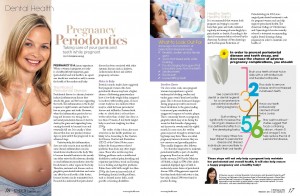 This article first appeared in the February 2015 issue of Ezyhealth magazine. We have reproduced it for the information of those of you who missed it when it was published.
This article first appeared in the February 2015 issue of Ezyhealth magazine. We have reproduced it for the information of those of you who missed it when it was published.
Pregnancy is a joyous experience. When a woman is pregnant, not only is a healthy lifestyle important, gum (periodontal) and oral health is an aspect one should not overlook as well, to ensure the health of the mother and baby.
The Price of Periodontal Disease
Periodontal disease is a chronic, bacteria-induced, inflammatory disease that attacks the gums and the bone supporting the teeth. This inflammation is the body’s response to fight bacteria and toxins that live on your gums and teeth. However, when the inflammation persists for too long and becomes too strong due to untreated periodontal disease, it starts to destroy the gums and supporting bone, causing the teeth to become loose and eventually fall out. It is usually a ‘silent disease’ that does not produce obvious signs or pain until it has progressed to an advanced stage.
Unfortunately this inflammation does not only occur in your mouth; the same chronic inflammation can also wreak havoc elsewhere in the body. This is because harmful bacteria in the mouth can either enter the blood stream directly, or send inflammatory mediators into the blood stream to other organs in the body. Therefore, maternal oral diseases such as gingivitis, periodontal infection and caries can affect the oral health of the foetus, because bacteria can be transmitted to it. Research has indicated that periodontal disease has been associated with other systemic diseases such as diabetes, cardiovascular disease and adverse pregnancy outcomes.
Risks to Baby
Several research studies have suggested that pregnant women who have periodontal disease may have a higher chance of delivering prematurely or have a low-birth-weight baby, compared to mothers with healthy gums. A more recent study has also indicated there may be a link between periodontal disease and stillbirths. Preterm birth refers to a birth that is at least 3 weeks earlier than a baby’s due date ie. less than 37 weeks. A low birth weight baby is one born weighing less than 2500g.
The earlier a baby is born, the more severe his or her health problems are likely to be. According to the Centers for Disease Control and Prevention (CDC) of the United States, more infants die from preterm-related problems than from any other single cause. Those who survive may face lifelong problems such as intellectual disabilities, cerebral palsy, breathing and respiratory problems, visual and hearing loss or feeding and digestive problems. Babies born with birth weight less than2500g also have an increased risk of developing chronic health problems such as delayed motor skills, social growth or learning disabilities.
What to Look Out For
Some signs and symptoms of periodontal disease include:
- Reddish, swollen and/or tender gums
- Gums that bleed easily while brushing
- Pus discharging from gums that has pulled away from the teeth
- Sensitive teeth
- Bad breath
- Loose / drifting teeth
Swollen Gums
On a less severe scale, some pregnant women may experience a greater tendency for bleeding, swollen and tender gums even if they have healthy gums. This is because hormonal changes during pregnancy result in increased blood circulation to the gums, leading to increased gum sensitivity and exaggerated response to bacteria plaque. This is commonly known as pregnancy gingivitis which may set in during the 2nd or 3rd month of pregnancy and increase in severity until the 8th month. In some cases, the swollen gums may react strongly to irritants and big lumps may form. These are called pregnancy tumours; however they are not cancerous and generally painless. They usually disappear after delivery.
It is therefore imperative to maintain periodontal health as part of a healthy pregnancy. Based on an adult oral health survey in 2003 by the Ministry of Health; as high as 85% of the adults examined displayed signs of mild to moderately-severe forms of periodontal disease. 89% of Singaporeans reported that they brush their teeth twice a day but only a dismal 33% were found to practice flossing.
Healthy Teeth, Healthy Baby!
It is recommended that women both pregnant and trying to conceive have their gums and teeth evaluated regularly and managed accordingly by a periodontist or dentist. According to the clinical recommendations released by the American Academy of Periodontology and the European Federation of Periodontology in 2013, non-surgical periodontal treatment is safe for pregnant women and can help improve periodontal health. The American College of Obstetricians and Gynecologists has also recently released a statement recommending regular dental cleanings during pregnancy in order to maintain oral health.
In order to prevent periodontal disease and tooth decay, and decrease the chance of adverse pregnancy complications, one should:
1) Brush your teeth at least twice daily with a soft-bristle brush and fluoride toothpaste.
2) Floss daily to remove plaque and food trapped in-between teeth.
3) See a periodontist, dentist or dental hygienist for a comprehensive periodontal evaluation during pregnancy.
4) Have your teeth professionally cleaned at least twice a year.
5) Quit smoking – it significantly increases the risk of gum disease and has detrimental effects to the developing foetus.
6) Stay well-nourished – studies suggest that foods containing calcium, vitamin D and omega-3 may help reduce the risk of periodontal disease.
7) Stay happy! Stress has been linked to periodontal disease and stressed individuals are more likely to neglect their oral health.
These steps will not only help a pregnant lady maintain her periodontal and overall health, it will also help ensure a happy pregnancy and a healthy baby!
 Dr Daylene Leong is a Dental Specialist in Periodontics with Specialist Dental Group®. She received her training in the specialty area of Periodontology from the University of Michigan, USA. Dr Leong is a Diplomate of the American Board of Periodontology and a Clinical Tutor with the National University of Singapore. She has a special interest in periodontal aesthetics, gingival plastic surgery and dental implants. For more information, visit www.specialistdentalgroup.com.
Dr Daylene Leong is a Dental Specialist in Periodontics with Specialist Dental Group®. She received her training in the specialty area of Periodontology from the University of Michigan, USA. Dr Leong is a Diplomate of the American Board of Periodontology and a Clinical Tutor with the National University of Singapore. She has a special interest in periodontal aesthetics, gingival plastic surgery and dental implants. For more information, visit www.specialistdentalgroup.com.





